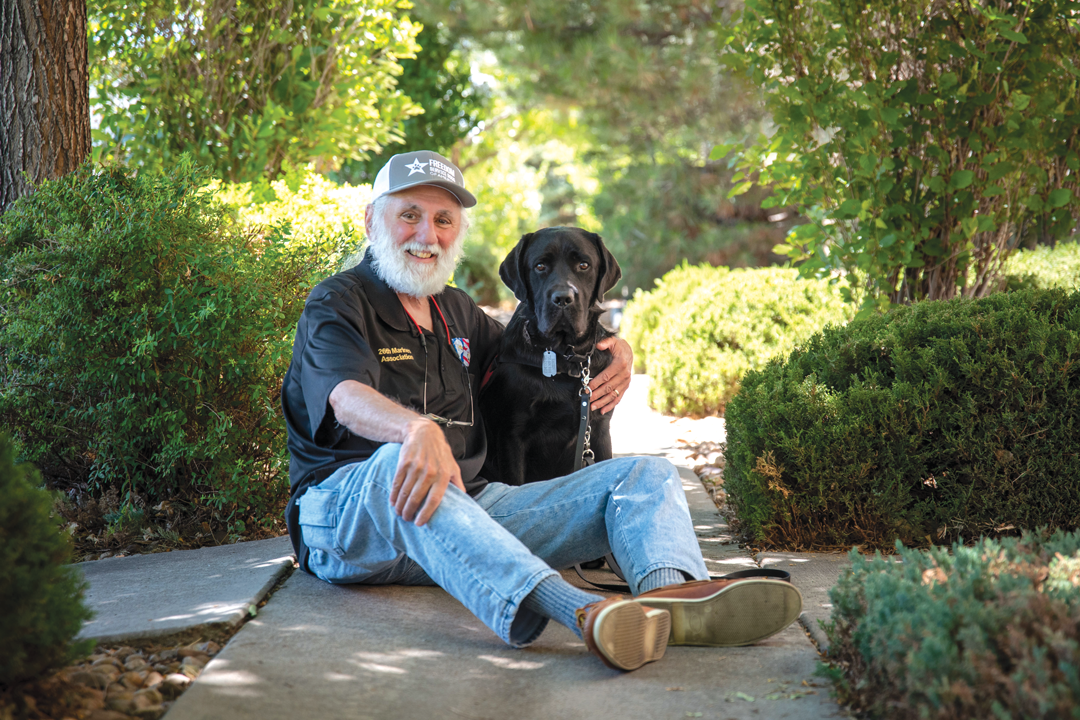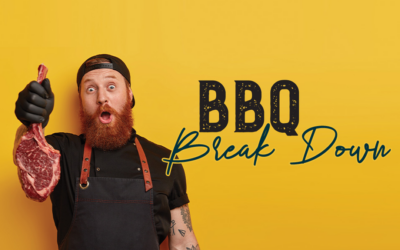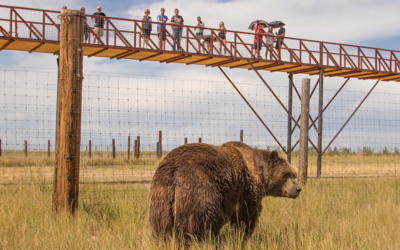Lynne Parks used to spend hours swimming, biking and running to train for Ironman triathlons, but these days, training looks like a morning sipping coffee at The Blue Mug in Greeley. That’s because of the puppy sleeping under her feet.
Paris, the 9-month-old female golden retriever, actually seems to be pretending to sleep. It’s a trick, but her tail gives her away. It bounces like a toddler on a trampoline every time someone comes by. But she stays silent on the floor, even when someone peers over Parks’ shoulder and asks to pet her. She can’t say hi to that person, gosh darn it, no matter how badly she wants to accept their pets, unless Parks gives her the OK.
Parks is just helping train Paris for a few weeks, and she plans to get her fourth puppy soon. She raises them as a volunteer for Freedom Service Dogs of America, a service dog organization in Englewood. It’s her job to keep each puppy for a little more than a year, then she gives them back to the organization, which employs special trainers who teach them more specific tasks to assist their future owners.

Lynne Parks, a volunteer for Freedom Service Dogs.
You’ve probably heard of guide dogs (or Seeing Eye dogs), but service dogs can help with many other disabilities such as autism, PTSD, brain injuries and limited mobility. They can pick up dropped phones, stop tics or wake a veteran from a combat dream. Service dogs can even alert someone if they sense a seizure coming on or if a diabetic’s blood sugar is low. But first, they need to learn to pee outside.
“We get them through the teenage years, which is hard because they start to get their independence,” Parks says. She’s raised two kids with her husband, Marshall, so she gets it. “Is it perfect? No. But it’s not perfect with your kids either.”
Other puppy duties include obedience, walking on a leash and general manners, such as not jumping all over guests. Socializing is huge, so Parks may allow Paris a little petting time, and she occasionally takes her to see the Avs or a movie or to sit in a restaurant, where the expectation is that she won’t beg for food regardless of how good it smells.
Yes, Parks catches feelings, but for her, the job is emotionally easier than the 30 or so dogs she has fostered. Many were troubled souls scarred by bad experiences with bad owners.
“I didn’t want to hear about their backgrounds,” Parks says. “It would just crush me.”
She also understands that it takes a village, as the saying goes, and she is the second step in a line of people who train the dogs the organization delivers to people who need them, free of charge. Parks gets them early on, as young as 8 weeks. There are others who watch the puppies over the weekend to give the raisers a break, then there are the advanced trainers and staff.
“They’re not your dogs,” Parks says, “but they’ll always be your puppies.”
Raising puppies into service dogs
Parks is not a dog behaviorist or a certified trainer, says Izzy Greer, puppy development trainer for Freedom Service Dogs, but puppy raisers are just as important. It’s Greer’s job to watch over them and keep them on track.
“They do lots of things, but the true goal is teaching our puppies that humans are someone they can trust,” she says. “They are so, so essential. The things we find normal can be so scary to puppies. They help get our dogs out there.”
Dogs need to be confident, Greer says, because later on, they will become the anchor for someone the way their puppy raisers were for them.
“Our dogs have to be bomb proof,” she says. “If something major happens, they’d have to be fine.”
Puppy volunteers cut the cost of raising a service dog in half, Greer says, and that’s significant: It saves Freedom Service Dogs of America tens of thousands of dollars a year. Other organizations say the same thing, and trainers who teach the dogs advanced skills call the work puppy raisers do “invaluable.”
“Without the raisers taking them out, exposing them to sights and smells and doing the basics, we wouldn’t have the success rate we do,” says Heidi Vollrath, a trainer for Freedom Service Dogs.
Kyle Lephart, executive director of Canine Partners of the Rockies, a service dog organization in Aurora, says the number of dogs they can give away depends as much on puppy raisers as donations.
“Our growth is limited by volunteers,” he says. “We can’t have dogs if we don’t have people raising them.”
Well-behaved pups give Freedom Service Dogs the option to essentially ask them what they want to do. Vollrath looks through a potential client list and tries to match their service dogs with the people they will best serve. A chill dog, for instance, would be best for a client who doesn’t leave the house much. On the other hand, the blind require a specific, complex service better handled by places such as Guide Dogs for the Blind.
“That’s what is unique about our organization: Rather than try to fit them into a specific skill, we can figure out what the dog can do and enjoys doing,” Vollrath says.
Service dogs do fail at certain jobs, just like humans. In fact, more than half of dogs in training don’t make it as a service dog. But they are usually able to fill another role, such as a therapy dog, because of the training puppy raisers give them, Vollrath says.
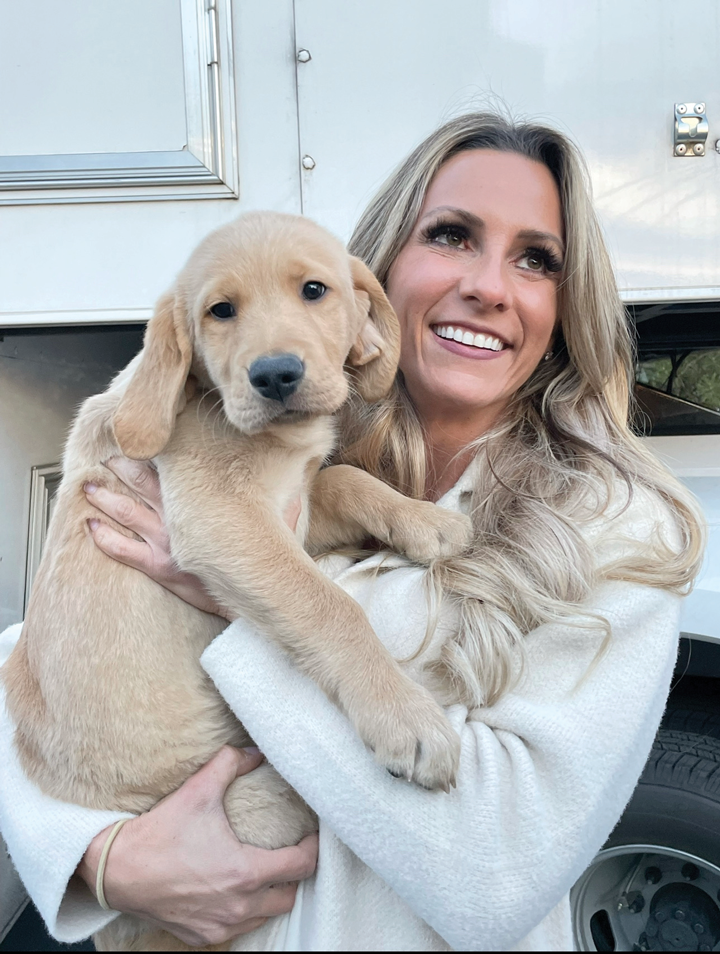
Julie Andrews holds an 8-week-old yellow lab that she will provide a foundation of love, basic obedience, socialization and good house manners for when he begins his journey to become a guide dog for a visually impaired person.
Sometimes the puppy raisers’ pets have to put in work too. Julie Andrews has a corgi mix, Molly, who has helped raise five puppies for Guide Dogs for the Blind since 2017. Molly is now 14 and doesn’t appreciate them as much as she used to.
“The first couple she was very playful with, but now she kind of tolerates them,” says Andrews, who lives in Windsor. “I’m actually taking a little break now after just raising one. Molly needs to breathe.”
Andrews follows a strict protocol for Guide Dogs for the Blind while raising her puppies, including socialization and basic obedience. That doesn’t bother her; she began raising puppies to feed her slight addiction to training dogs as a hobby. She even ran agility with a couple of them.
“Serving is a part of who I am,” Andrews says, “and if I can serve people through dogs, that’s a win-win.”
Earning their vest
Greer likes the idea of emotional support dogs, but they aren’t service dogs. When owners want them to have the same rights, she sighs in frustration at the thought.
The law states that the only dogs that should be allowed full public access are service dogs because they are covered under the Americans with Disabilities Act. Service dog standards are high, Greer says, and trainers work hard to meet them. When dogs can’t meet those standards, they don’t work as service dogs. Emotional support dogs don’t have those same standards.
“What’s unfortunate is people just want their dog with them, or they just throw on a vest, and when they aren’t acting the way they should, they rub people the wrong way,” Greer says. “Then you’re leaving that for others to deal with.”
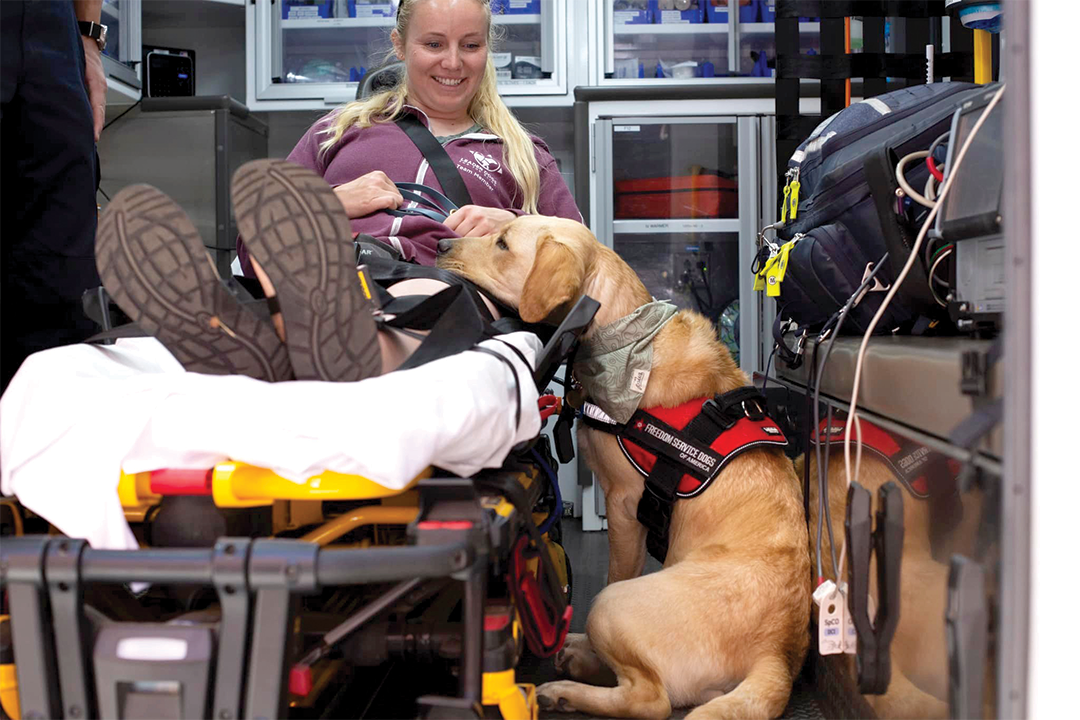
Kingston, a service dog trainee, practices working around medical equipment. Photo courtesy of Freedom Service Dogs.
Business owners may not know the difference and try to ban service dogs from their place because an untrained emotional support dog peed on the floor or, worse, bit a customer. This causes problems for people with service dogs who just want access to a normal life.
“That’s not something they should have to fight,” Greer says of people who use service dogs.
People are allowed to ask two specific questions, she says, even if those with a service dog don’t have to show papers: Is this service dog required because of a disability? What task has the dog been trained to perform to help with that disability? Emotional support is not an eligible task.
Airlines, for instance, no longer allow emotional support animals on flights. Flights are stressful, and many of those animals caused problems because they didn’t have the same training.
“They aren’t trained out in public,” Lephart says. “You’re potentially putting dogs there that may not be comfortable in a situation and won’t be able to handle it the same way as a service dog.”
An alternative option is a facility dog, one of the specialties of Canine Partners, which allows people to be comforted in stressful environments without bringing their own emotional support animals and potentially causing problems. The organization has placed a facility dog with a trained handler in Children’s Hospital Colorado (they have several there now), a District Attorney’s office and a therapy center, for example.
“The feedback we often get is that what would take a person an hour to do, a dog can do in 10 minutes,” Lephart says. “They’re nonjudgmental, and people have special bonds with dogs. It’s not the same with people. They are huge barrier breakers.”
The dog-owner bond
Raisin, Terry Rizzuti’s service dog, is so smart that he even knows when to be naughty.
When Rizzuti, 77, uses the restroom in their Estes Park home, Raisin will get up from his bed by Rizzuti’s favorite chair, rush over to Rizzuti’s wife and get a treat. As soon as the toilet flushes, Raisin will race back to his bed.
“And then he looks at me when I sit back down like, ‘What? I’ve been here this entire time,’” Rizzuti says.
Rizzuti needs Raisin’s smarts if he wants to venture out into the world. He’s a Vietnam vet with PTSD, and that makes the world a scary place. Even a walk in the woods was hard for him.
“When I went hiking,” Rizzuti says, “I’d see an ambush around every corner.”
Raisin solved as much of that as possible through the skills he learned at Freedom Service Dogs. He wakes Rizzuti up from nightmares, stands between him and crowds to give him space and presses up against him when he senses that his other dog will start barking.
“He can sense when I’m getting nervous even before I’m nervous,” Rizzuti says.
Raisin solved the hiking issue by distracting Rizzuti from thinking too much about what may be lurking behind a tree. He tugs on his leash, sniffs around and provides a general sense of security that Rizzuti hadn’t felt before he got him.
“I trust him to sense danger faster than I can, so I can relax,” he says. “Even when his tail is wagging because he loves everyone, he’s letting me know someone is there.”
Since Raisin came from a place that trains service dogs, he will occasionally bust out a skill that Rizzuti doesn’t need but also kind of likes.
“Sometimes, when my hands are full, he will push the handicap door button in a store and open the doors for me,” he says.
Rizzuti likes to write. He wrote a novel about Vietnam, “The Second Tour,” that’s been through numerous printings and editions. That’s because he keeps adding to it. He can’t leave it alone.
“Raisin is in the latest edition,” Rizzuti says. “He’s a part of my story now.”
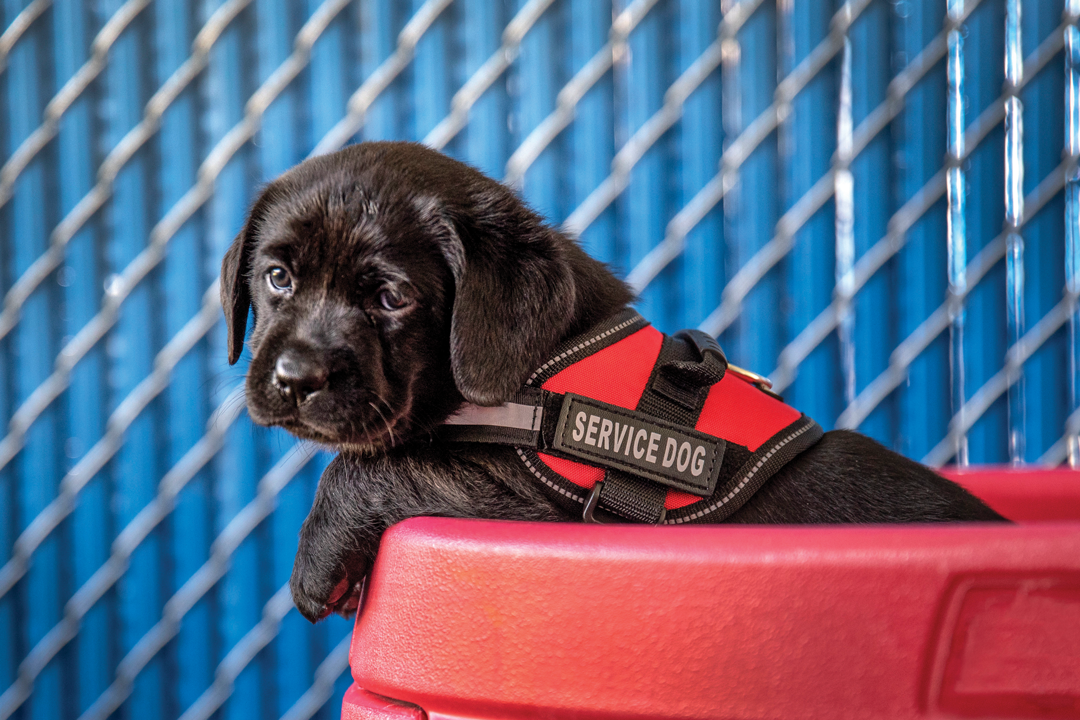
A future Freedom Service Dog. Photo by Amanda Engel Photography.
What can service dogs do?
Service dogs help people with these common challenges (and many others):
Autism. Dogs can interrupt behaviors through distraction or even by bumping their owner’s hand. Sometimes parents of children with autism can instruct the dog to help.
Veterans with PTSD. Dogs can pick up on tells that an anxiety attack is about to begin. Veterans can talk to a trainer about their specific tells, and the trainer can teach the dog their tells to help them sense when they need to move close.
Mobility issues. Dogs can pick up dropped items, open doors and fetch things such as a phone.
Blindness. Dogs can act as eyes for the blind, guiding them along walkways and avoiding danger in addition to doing tasks to help them.
Trauma. Dogs can be trained to help comfort people and first responders in the wake of traumatic events, like school shootings.


